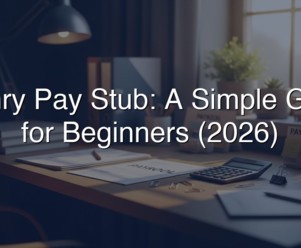All You Need To Know About Final Pay And Quitting - What to Know
By Jaden Miller , June 21 2023

When an employee leaves a company or organization, there are certain rules and regulations to adhere to. This includes their final pay. The employer is responsible for ensuring the recent employee leaves with the correct final pay, but knowing how much and when to pay this can be somewhat challenging. This is mainly because different states have different rules and processes in place.
Also read: A Complete Guide To Workplace Harassment
To ensure all the protocols and the laws are being followed correctly when an employee leaves a job, an employee termination checklist should be examined. One of the main responsibilities of this check list is giving the employee their final pay.
Whether an employee leaves their role voluntarily, is laid off, or they are dismissed, various loose ends need to be taken into account and tied up. This includes severance pay, possible unemployment insurance, COBRA (continuation of health benefits), and the final paycheck.
Federal law states that employers are not required to pay an employee’s final paycheck immediately after they have left. But, some states do require an immediate payment. If the usual pay day for the previous pay period has passed and the employee has not yet had their pay, then they may need to contact the state labor department or the Department of Labor's Wage and Hour Division. Here, they can recover lost wage packets for employees.
In today’s article, we are going to discuss all you need to know about your final paycheck if you have recently left a job, whether you quit or were let go.
Also read: Full Time Vs Part Time Hours

Termination Pay Rules
An employee is entitled to their last paycheck, whether they were dismissed or if they quit of their own accord.
This final paycheck should hold the employee’s standard wages from their recent pay period, as well as any other forms of compensation they may be entitled to. These can include bonuses, commission payments, or accrued vacation.
In some cases, an employer can withhold money from the last paycheck of an employee, but only if they owe the business anything. You must also have written confirmation to authorize this. An example would be if an employee owes a company some form of compensation or payment from a previous salary advance agreement. An employer must check with their state before doing this, however.
What an employer can not do is withhold any unpaid wages that the employer has earned. This applies to those who have quit and been let go. Moreover, it is not possible to attach a condition of receipt to the employees final paycheck.
As we mentioned above, final paycheck laws will differ from state to state. Because of this, it can make things a little complicated. But, just by simply giving a terminated employee their final pay on their last day, it can make the whole process much easier. Do this and there is no need for the employee to possibly pick it up from the business at a later date or mail it to them.
Also read: The Role of HR During Employer Termination
Severance Pay: What Is It?
It is important to understand that an employee’s final paycheck is not the same as severance pay.
Severance pay covers money that is paid to an employee for a period of time after they left or lost their job. Severance pay is typically negotiable, unlike the final paycheck. And, more often than not, employers will require a signature from the terminated employee to ensure that they do not sue the business further down the road after accepting the severance payment.

Most of the time, severance pay consists of one or two months' worth of salary and is given to employees who have had to leave their jobs due to no wrongdoing or fault of their own.
For employees who are laid off, most employers do not need to provide any severance pay. However, many still offer some sort of severance pay to those who have been terminated or laid off. Some can be so generous as to base a long term employee’s severance package on how long they have been with the company, such as a week’s pay for each year they were employed there.
Also read: 5 Reasons You Need To Perfect A Job Description
When Should an Employee Receive Their Final Paycheck?
Most states have set laws that state when a departing employee should get paid their final paycheck. In most cases, this time limit will depend on whether the individual quit or was dismissed.
In certain states, employees need to be paid their final paycheck immediately after being laid off or within a certain number of hours after the termination has taken place. Moreover, if they quit, they may not be entitled to their paycheck until the next scheduled payday.
A few of these state laws also stipulate if accrued, yet unused vacation pay should be part of the final paycheck or not.
State by State Final Paycheck Laws
Currently, there is no federal law that specifies whether an employer needs to pay terminated employees their final paycheck immediately. However, as we have mentioned above, some states do require this or within a distinct time frame.
The final paycheck due dates will usually depend on a state’s laws and whether the employee quit or was laid off.
All employers must follow their state’s final paycheck laws. If they fail to do this, various penalties could occur and even lawsuits. Some states may also have further rules and regulations on paying other amounts to ex employees and certain benefits, such as health insurance.
You can find a breakdown of final paycheck laws in different states here.
In Summary
The state you or the business you work for resides in determines final paycheck laws after an employee has either been laid off or quit their job.
Although there is no federal law specifying when an ex employee should get paid their final paycheck, each state will have set laws regarding this. In most cases, it will be within a certain time frame.
If you need to generate a paystub, why don't you give our paystub generator a try? It will help you recognize what taxes you are paying.
Also read: Confidentiality And HR

Similar Articles
We’ve helped numerous individuals and businesses create professional documents! Create yours today!










